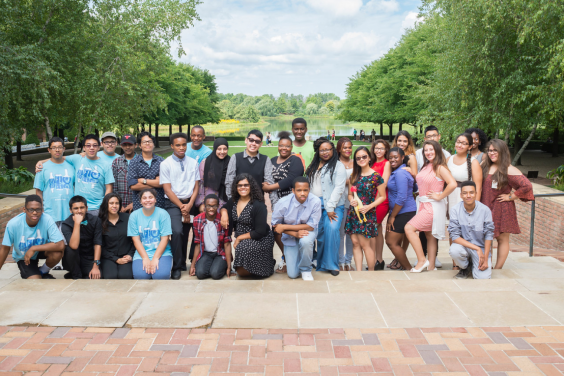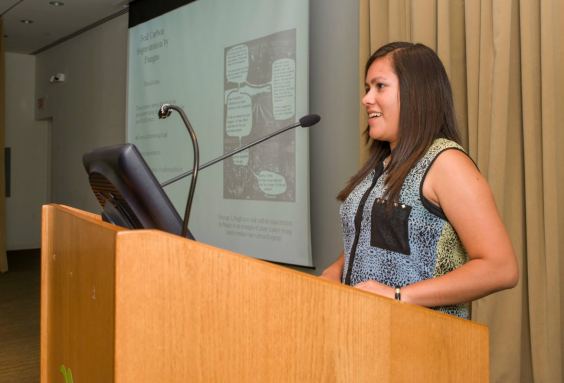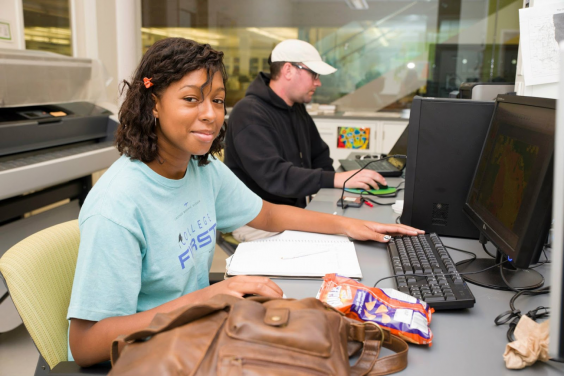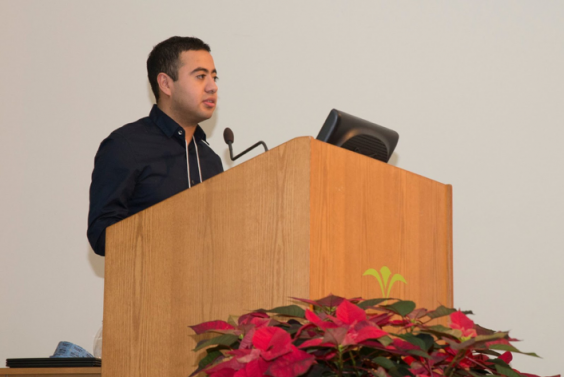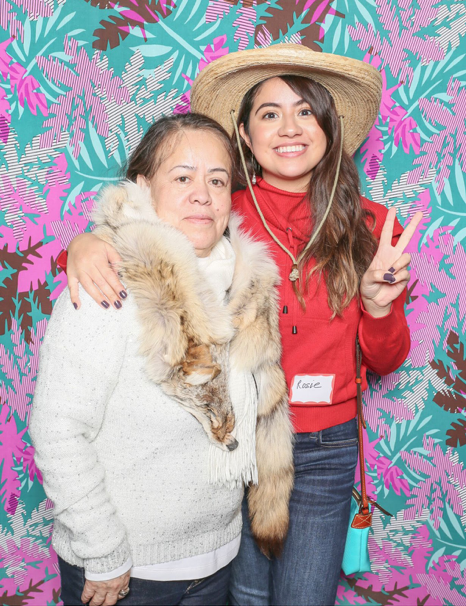How Four Special Alumni Turned STEM Summer Camp into #CareerGoals
THIS is what it’s all about! ULIEA winners are hard at work inspiring and providing platforms for today’s youth to become tomorrow’s scientists, engineers, mathematicians, and environmentalists and Chicago Botanic Garden’s Science Career Continuum (SCC) program is a prime example. Discover how four program alumni overcame the odds to achieve game-changing feats, thanks to their SCC program participation.
We created the UL Innovative Education Award (ULIEA) in 2015 to support organizations that are directly responsible for creating the next generation of STEM and environmental leaders. Ultimately, it’s about the kids. Our 2017 grand prize winner, Chicago Botanic Garden shares our enthusiasm and commitment with their Science Career Continuum program, an annual science immersion program that introduces 60 middle and high school students from Chicago Public Schools to paid internships and mentoring that improves their overall academic performance and puts them on a path to college. According to the SCC website, “The goal is to prepare a new generation of scientists who have the education and training needed to address the environmental and conservation challenges of our time.” Bingo—ULIEA gold!
Chicago Botanic Gardens offers three sub-programs within the larger SCC program:
-
Science First: a four-week summer camp that allows 40 participants to engage in the Garden's natural habitats, learn botany and ecology, and use the scientific method to answer real-world science problems.
-
College First: an eight-week, paid high school internship offering career mentorship, field ecology and conservation science exposure, and college prep and assistance.
-
Undergraduate Opportunities:
-
Each year, three College First alumni participate in the nationally-competitive Research Experiences for Undergraduates (REU) program alongside students from across the country. Funded by the National Science Foundation, REU internships provide undergraduate participants an opportunity to explore a diverse array of scientific fields related to plant biology and conservation under the supervision of a Garden research scientist. Available to two students who complete the College First program,
-
Science First (SF) teaching internships offer program alumni the chance to assist with program delivery and serve as mentors to the SF students
-
What’s astounding about the SCC program is not just the curriculum, but the long-lasting impressions and effects the program has on alumni. Program participants gain a better understanding of their natural environment, develop a sense of belonging in the STEM fields, and feel motivated to become environmental stewards by majoring in a STEM field, pursuing a career in the environmental field or making a commitment to stay informed about environmental issues. Based on internal survey results, SCC has seen roughly 53 percent of alumni go on to earn STEM-related degrees, and the program has been uniquely effective in encouraging students to be the first generation of their family to receive higher education.
Four alumni, in particular, stand out to SCC as great examples of how the program influences their participants. Their stories will blow you away.
Erica Rocha
Erica Rocha, a Chicago-native, started with the SCC program in 2013 as a College First student the summer before her senior year of high school. There she learned the basics of environmental science and conservation and how to contribute to related ongoing, issues by assisting an REU intern with a postdoctoral research project on carbon sequestration and degradation of fungi in soils. She returned in 2015 as a REU intern herself, and worked in the Population Genetics lab in the Plant Science Research Center. She took the lead in mentoring a College First high school student, and together, they supported a postdoctoral research project on genetic diversity of a common plant used in the Gardens’ green roofs.
“This is the first place where I learned about the importance of diversity in STEM and what I could do to pursue a career in conservation. I also learned new lab skills and how they apply to real-life modern research. I specifically learned genetic analysis, DNA extraction, PCR, and other valuable research methods,” explains Rocha.
After SCC, Rocha went on to become a Doris Duke Conservation Scholar at UC Santa Cruz, and an animal behavior intern at the St. Louis Zoo.
Today, Rocha is an undergraduate senior at Dominican University with aspirations to work in wildlife conservation with a focus on climate change and endangered species. She will be the first in her family to graduate from college.
Rocha reflects upon her SCC experience with pride and gratitude: “This program benefited my life because it gave me resources I needed as a woman of color to kickstart my career in environmental conservation. SCC is valuable because they focus on their students and interns by providing transportation, field trips, networking, and research opportunities that I wouldn’t otherwise have had. It definitely allowed me to have a spot in a place that lacks so much diversity and gave me confidence in my knowledge and what I can bring to the table regardless of my race and socioeconomic background. Being surrounded with people my age that are interested in the same things allowed me to realize that I am not alone and have a support system in the science community. It also allowed me to learn from professionals in the field and how I can build my own career based on their own experiences.”
Jannice Newson
Jannice started with SCC as part of the College First program in 2013 after hearing about the program from a flyer at her high school. Following College First, Jannice became a Science First teaching assistant, and the following year, went on to participate in the REU program. During her three summers at SCC, she studied environmental science, assisted kids conducting science experiments, completed a project on shoreline restoration evaluation and learned how to execute field work and work with large data sets.
Today, Jannice is studying environmental science with an emphasis in water quality at the University of Minnesota with plans to pursue a master's degree in environmental science. Later, she hopes to participate in administering environmental research opportunities for underrepresented groups in STEM.
She describes her SCC experience as “impactful,” and feels confident other participants will benefit equally from their time with SCC. “The program brings students separated from nature right into the midst of it. It's scary, it's unknown, but it becomes familiar to them, and hopefully enjoyable. The program has the potential to help students envision themselves in the STEM field, a place they may have never seen themselves before.”
Oscar and Rosalba Herrera
Oscar and Rosalba have a unique SCC story, as they are siblings. Oscar participated in Science First in 2003, completed College First in 2007, and went on to the REU program during his undergraduate years. Rosalba followed in his footsteps by starting Science First in 2008, graduating College First in 2012 and joining the REU program in 2013. Today, Oscar has received his Master of Science in Chemistry and Rosalba will receive her undergraduate degree in physics this May. Their younger brother Sacramento will begin his third year in the SCC this summer.
Oscar and Rosalba’s individual achievements are notable, however, it’s their familial ties that make them a truly special case. Oscar led the way for his sister’s interest and participation: “Being the eldest of my family, I was able to expose my siblings to a research conference. I took them to research symposiums and to see graduate students present their research projects. We also watch STEM documentaries (mostly about the universe or space topics), and we have a whiteboard at home where we practice solving equations and chemical reactions,” he explains.
Rosalba describes, “My brother Oscar influenced my experience by motivating me to participate in the Science Career Continuum program. Seeing how my brother enjoyed the program, I was curious into what plant science was and the careers in such field. I was fascinated by the opportunities that the program offers such as internships, college visits and educational field trips.”
Oscar and his siblings are a great example for parents looking to engage youth in STEM topics. By getting just one child involved, parents may influence their other children. SCC takes pride in creating these spaces for influence: “Many of the students in the program will be the first in their families to attend college so we are creating an environment where first generation students are receiving support from their siblings through shared lived experiences. In that way we also really get to know families and we have a better understanding of how to serve their communities,” explains SCC program manager, Beatriz Cañas. “Many times an older sibling will join a SCC program and we hear from parents that their younger sibling cannot wait to finish sixth grade to start Science First. It’s really something that we love to hear.”
SCC makes a point to encourage participants’ families to attend workshops and presentations so they can learn from the experience. They also invite parents and younger siblings to go on college tours with the College First students. These platforms provide the opportunity for many students to benefit from all SCC has to offer.
All four of these alumni stories exemplify the power our ULIEA winners wield in encouraging and developing the next generation of STEM and environmental experts. Erica, Jannice, Oscar and Rosalba are the reasons why ULIEA exists—they are SCC’s mission and they are our mission.
Congrats to all four students on their amazing accomplishments! We cannot wait to see what you will do next.
